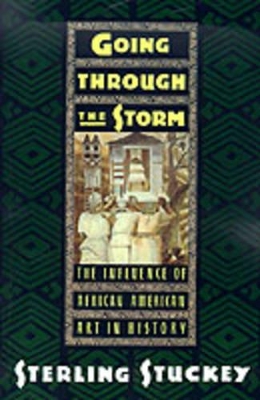Upon his arrival in the North, Frederick Douglass found, to his utter astonishment, "persons who could speak of the singing among slaves as the evidence of their contentment and happiness." As late as 1903, W.E.B. Du Bois observed that African American spirituals had led naive whites to believe that "life was joyous to the black slave, careless and happy." While these misconceptions have largely disappeared, the history of African American culture--and its importance to American history as a whole--is still a subject little understood by the majority of Americans.
In Going Through the Storm, Sterling Stuckey offers a compelling look at one of the world's richest cultural traditions. He traces the fertile legacy of African American art from its roots in tribal myth, through its blossoming in slave music and dance, to its fruition in the great gospel-singing movements of the 1960s. In the process he shows how this tradition, grounded as it was in adversity, represents one of the great triumphs of the human spirit: slaves and their descendants, by way of Negro spirituals, the blues, and jazz, transformed the pain of oppression into a transcendent and timeless beauty. And, as he explores these various styles, Stuckey reveals that the development of a distinctive African American aesthetic follows (and helps illuminate) the course of the nation's history.
In a series of engaging, lucidly written essays, Going Through the Storm covers the entire spectrum of African American culture, offering along the way many fresh and important insights. Within the context of slavery and slave music, Stuckey presents a new look at the foundations of black nationalism and the civil rights movement. In his eloquent reflections on Paul Robeson, he shows how black art offers a commentary on the human spirit so genuine and resonant that its appeal has reached across the boundaries of race to touch most of humanity. Writing of Herman Melville, he demonstrates how the great novelist was struck with the importance of African culture in history--and the reciprocal relationship of history to African culture--and carefully explored this theme in Benito Cereno. Frederick Douglass is presented for the first time as a major theorist of African American culture, one whose thought is profoundly relevant to our current debates on culture and race. And, perhaps most important, Stuckey explains that because black artists have been deeply interested for so long in the question of oppression, their art is of particular use to historians. In what amounts to nothing less than a revolutionary approach, Stuckey considers the uses of music as history, arguing that an easing of barriers between academic disciplines will lead to a better understanding of human life in general.
A timely, readable, and often moving volume, Going Through the Storm not only expands our understanding of black music, dance, literature, and folklore, but provides a new vantage point from which to view the entire landscape of American culture.
- ISBN10 019508604X
- ISBN13 9780195086041
- Publish Date 17 March 1994 (first published 6 January 1994)
- Publish Status Active
- Publish Country US
- Imprint Oxford University Press Inc
- Format Paperback
- Pages 308
- Language English
